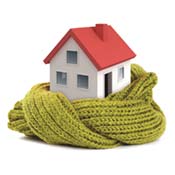Written on: February 5, 2015
Energy Saving Tips for Cold Weather

For many people, cold weather always means high heating bills – especially if you have an older, less efficient furnace or boiler. (If your heating system is more than 15 years old, it might be time to replace it when spring arrives; a new high efficiency model will quickly pay for itself by saving you about 30 percent or more on your heating bills).
But even the best-performing equipment can do only so much to keep your bills down. You can supplement your savings by using your heat wisely and making your home more energy efficient.
- Control your temperature. Install a programmable thermostat so you can automatically lower temperatures when no one is home or everyone is asleep. When used properly, a programmable thermostat can save you about $100 a year. Contact us if you would like to learn more about the new generation of programmable “smart” thermostats—these let you change the temperature with your smartphone or computer at any time, no matter where you are.
- Claim your tax credit. If you’re a New York customer, you should have received BioHeat tax information and a tax form in the mail from us. If you didn’t, please contact us so you can apply for a 20¢-per-gallon BioHeat® tax credit for using Westmore BioHeat®. All of our customers benefit because Westmore only delivers ultra-low-sulfur BioHeat®, which burns more efficiently, saving you money in heating costs and prolonging the life of your heating equipment.
- Seal the deal. One of the most cost-effective ways to lower your overall energy bill is to reduce the amount of air leaking into and out of your home. The Department of Energy estimates that you can save up to 20 percent on your energy bills by properly sealing your windows, doors, ducts and even your electrical outlets.
- Keep it clean. If you have a warm air system, keep your furnace filter clean to save up to 5 percent on your bill (you should replace/clean filters about once a month during the heating season).
- Pipe down. Insulate water pipes in untreated areas of your home, including attics, basements, and crawl spaces to minimize heat loss.
- Let the sunshine in. Keep window shades or drapes open to absorb solar heat from the sun during the day, and then minimize heat loss by closing curtains at night.
- Clear the (hot) air. Keep your baseboard heaters, radiators, and heat registers clear from furniture, drapery or rugs so hot air can flow more easily through the room.
- Control heat output and save 10% or more. Modulating aquastats or outdoor reset controls can be added to your boiler system. These controls automatically adjust the boiler’s water temperature depending on the outdoor temperature. If it’s not cold outside, your boiler’s water doesn’t have to get as hot, which conserves fuel. There will also be less heat lost through the pipes when your boiler shuts off.
